The following list of dos and don’ts for how to fix a relationship you “ruined” isn’t theoretical. It’s the wisdom I use to help couples every day.
As a couples therapist who has helped thousands of couples bring their relationship back from the brink, take it from me…
There is hope for your relationship.
How to Fix a Relationship You Ruined: Expert Dos and Don'ts
How to Fix a Relationship You Ruined

1. Don't keep apologizing.
Welp, the world has ended. You dropped the ball. The train is wrecked.
Whatever metaphor you wanna use, you’re here: Your relationship seems like it’s falling apart and it’s your fault.
Oof!
That’s awful. I mean it—you must be feeling terrible. Guilty, sad, angry, scared… and asking yourself, “How do I fix this?”
And when the guilt and pressure after hurting your partner becomes too much to bear, an apology can feel like a release valve…
for you.
For your boyfriend/girlfriend/wife/husband/partner or the neighbor whose flowerbed your dog crushed, an apology can feel more like an invitation to forgive you than an expression of understanding and remorse.
Sometimes it acts as a shield, protecting you from the terror of being abandoned or a disappointment…
“I’m sorry, I’m sorry, I’m sorry, I’m sorry.”
Other times it’s a bid to get back to the relationship you used to have.
I can’t tell you how many times a couples therapy client has sat across from me and said to their partner, “Geeze, how many times do I have to say I’m sorry??”
Well here’s what I say: Sorry, smorry!
Listen, your apology is probably coming from a sincere place. But it’s not what your relationship actually needs.
…What you actually need to help mend a relationship you “broke” is an empathetic experience.
you must know sorrow as the other deepest thing.
Then it is only kindness that makes sense anymore."

2. Empathize with your partner.
Empathizing with the partner you’ve hurt may seem like an obvious first step in saving your relationship with them, but it can actually be… rough.
You’re really not gonna want to dwell in the sheer depth of the pain you’ve caused—who would!?
But it’s what your partner actually needs, and—believe it or not—it’s what you need!
No matter what sort of betrayal or hurt lies at the center of your current relationship rift, what your partner is really experiencing is an Attachment Injury.
Attachment just means that you need to be safely emotionally bonded with your person—it’s a biological fact that has been true for you both since infancy—so that when it looks like you’re not, it’s terrifying!
These are two real definitions of what love is:
- You’re so important to me that when you’re not there, I’m terrified.
- You’re so important to me that when it looks like I’m a disappointment to you, I’m terrified.
“Are you there for me?” and “Am I enough for you?”
In couples therapy, one of the earliest steps in the Empathi process when a couple is healing after an affair is to identify all the different betrayals felt.
Just some of these betrayals can be:
- “You didn’t consider my feelings.”
- “You’ve shamed me.”
- “You made me feel stupid.”
- “You gaslit me.”
- “You told other people who I know about this.”
- “You’ve had this other life without me.”
- “You weren’t there for me.”
- “You told them you loved them.”
Because what your partner needs is to feel like you really deeply get it, and they may not totally get it themselves yet…
That all these different aches are just messages they’ve received that either you’re not there for them or they’re not enough for you.
You understanding, empathizing with, and accepting them says I am here for you and you are enough.
And this is the part you need to hear:
They feel that way because they love you.
They’re terrified now because they love you.
You’re terrified because you love them!
But understanding that can be pretty difficult when you’re busy telling a different story about who you are…

3. Don't try to prove you've changed.
You might be tempted to fix your relationship with grand gestures, big lifestyle changes, sharing everything, and being super attentive…
But holding a boombox over your head only works in the movies.
Obviously, if you have what I call a “third person in the relationship”—which can be anything from an affair partner to your cell phone—it’s a good idea to demonstrate that you will be there for and otherwise choose your partner first.
The same goes for relationships harmed by lying—sticking to the truth is a safe bet!
But if your partner isn’t responding to these choices in the way you hoped they would (telling you they trust you again, forgiving you, laying off criticisms, feeling comfortable again), they don’t need more “tangible” proof.
They need a major perspective shift. And so do you.
The truth is, these big behavior changes set you up for failure in two ways:
A. Being the perfect partner is unsustainable.
Always having the right thing to say, being 100% attentive, becoming SO GOOD it erases all doubt in your partner’s mind… These are pipe dreams.
As much as your recent relationship problems might be motivating you to change right now, you’re still a human being.
You absolutely will continue to make mistakes and hurt your partner—Unfortunately, this is non-negotiable!
That’s just how human relationships work. We all get into negative systems with the people who matter to us from time to time.
Conflicts continuing to happen doesn’t mean you’ve ruined your relationship forever.
B. It helps you avoid what really needs to happen.
Everything that led to this moment in your relationship is still there, under the surface.
If you don’t learn how to face it head-on, it will bite your leg and pull you down before you can yell out “Shark!!”
Becoming the “best version of yourself” may feel like you’re facing all your fears—giving up every vice and indulgence, finally doing what you’re supposed to do and being who you’re supposed to be.
The thing is… that’s not what you’re really afraid of. And that’s not how to fix a relationship you ruined.
To discover that, you’ll have to get curious about yourself.
don’t take the second step
or the third,
start with the first
thing
close in,
the step
you don’t want to take."

4. Get curious about yourself.
Right now, you’re gonna wanna do everything in your power to avoid the guilt and shame and pain of being a disappointment or feeling abandoned…
Don’t.
It might not feel this way right now, but your relationship falling apart could be the perfect set of ingredients to stop you always trying to get away from what it is to be you.
You can stop hiding in lies and half-truths.
You can stop going to your affair partner, drinking habits, or work for comfort.
You can stop being afraid of being yourself.
Your partner may not be able to hear it right now—and once you can empathize fully with them, you’ll understand why that’s okay—but who you are makes sense.
The mistakes you made make sense. The feelings you have—even the scary “unacceptable” ones—they make sense.
Understanding the attachment and systems theory reasons why you do what you do and feel what you feel will help you to:
- Live as you are
- Share what you’re REALLY feeling with your partner
- Get the genuine support and acceptance you long for
The Empathi Quiz is a good place to start. I’ll break down which flavor of attachment needs you have (“Withdrawer” or “Pursuer”) and the system you and your partner co-create together.
But it’s vital that you don’t try to use this knowledge as a manipulation or tactic with your partner…

5. Don't use relationship repair 'strategies'
“But Figs… isn’t that what this whole article is about?”
Not exactly.
You won’t find step-by-step strategies for becoming the perfect partner or communication hacks on this website…
(though you might find some wisdom masquerading as those things 😉)
…Because your partner’s organism is millions of years old, and it knows when you’re in strategy!!
Here’s what I know does work, as a couples therapist:
Crafting perspective shifts and experiences, not changing behaviors.
When I help a couple really empathize with each other, the little ones inside of themselves, and all of them together—all trapped in a system that’s really painful and difficult—I don’t have to tell them how to comfort each other!
They just do it.
Getting there is a process, not a tactic.
This list can help you with some of the perspective shifts. It’s up to you to apply them to your relationship, or to decide to have an expert guide you through it.
“Okay, so if it’s not about words, it’s not about actions, and it’s not about tactics… what is it about?”
Empathy. Curiosity. and… Acceptance.
We can't go over it.
We can't go under it.
We can't go around it.
We gotta go through it."

6. Accept that this isn't going away.
It makes sense that you’re in suffering right now, you’ve hurt the person you love, and all you want to do is get back to good as soon as possible.
But this isn’t ever going away.
And I don’t mean that it’ll take significantly longer to move forward than you might be prepared for… though that’s true.
What I mean is that this hurt is going to be a feature in your relationship for the rest of your lives.
Your partner will always remember the time they felt deeply hurt by you, and it will remind them of all the other times they’ve been hurt or abandoned or rejected in love.
Ouch.
And that will terrify you, that you’ll never be fully forgiven and trusted again.
Double ouch.
But that’s okay. Better than okay—we don’t want those feelings to go away!
They’re honored guests. We need them in order to have “all needs met” experiences.
The truth is, the things you learned about your partner through empathy and about yourself through brave curiosity were all leading up to one thing…
Comforting each other.

“Wait, but I betrayed them. Why would they want me to be the person comforting them?”
Because that’s the missing experience.
That Attachment Injury I talked about in “Do empathize with your partner”? The person you love has been experiencing that flavor of rejection or abandonment their whole lives, ever since their “person” was a parent or guardian.
They—just like me, just like you—have been trying to heal that wound by creating experiences they never got when they were little.
But those missing experiences aren’t just outright acceptance or support… You have to heal in the places you were hurt.
They don’t need you to never hurt them again.
They need you to be the one who comforts them when they do get hurt, even when—especially when!—you’re the one who hurt them.
And you know what? You want the exact. same. thing.
So, yeah. This isn’t ever going away.
If you do this right, you’re both going to love up those parts forever.
That’s how to fix a relationship you ruined.
You do not have to walk on your knees
for a hundred miles through the desert repenting.
You only have to let the soft animal of your body
love what it loves."
How to Fix a Relationship You Ruined - FAQ
Have your questions answered by an experienced Emotionally-Focused Couples Therapist.
Who counts as someone who "ruined" a relationship?
The advice in this article is best suited for relationships featuring a betrayal such as:
- Cheating (Emotional or Physical)
- Lying (Big or little lies. Or “Big Little Lies”)
- Other breaches of trust
If emotions or patterns like “insecurity“ “overthinking“ and “workaholism” are causing relationship problems, you may instead benefit from a couples therapist walking you through your relationship system.
Following guidance designed to address relationship dynamics is not always the right first step.
Before you read the list below, ask yourself if you are having difficulties because of one of the following:
I’m a perpetrator →
If you think you may be engaging in abusive behaviors in your relationship, visit the National Domestic Violence Hotline’s Help for Abusive Partners page or call 1-800-799-7233.
There you can receive help recognizing unhealthy behaviors, learning de-escalation strategies, and identifying Battering Intervention and Prevention Programs (BIPP).
“At The Hotline, we treat all contacts with dignity and respect, and are committed to supporting anyone who wants to take responsibility for their actions.”
I’m a victim →
If you are or suspect you are the victim of abuse, please reach out for help at https://www.thehotline.org or by calling 1-800-799-SAFE (7233).
The guidance you’ll find on this page is not appropriate for those experiencing abuse and can be actively harmful. Do not try to fix your relationship on your own or with traditional relationship advice.
The Empathi method—which these tips are based on—guides partners to experiences of deep mutual support and acceptance.
If substance use is fundamentally affecting your ability to be present in your relationship, your capacity to provide those essential ingredients will be limited.
If you are seeking help around your use of alcohol or other drugs, you can call SAMHSA’s National Helpline at 1-800-662-HELP (4357) or find a treatment facility.
For more information about the signs and symptoms of substance abuse and addiction, visit Harvard Health Publishing’s Drug Abuse and Addiction guide.
If you are experiencing relationship distress around…
- Depression
- Trauma
- Anxiety
- Bipolar Disorder
- Borderline Personality Disorder
- & other mental health issues
…Empathi’s methods can help, but you may benefit from individual counseling before or in conjunction with couples therapy or other relationship-focused interventions.
How do you fix a relationship you ruined by cheating?
Accept that this isn’t going away.
To salvage a relationship wrecked by infidelity, you’re going to have to spend a lot more time than you want sitting in uncomfortable feelings.
Every molecule in your body is going to want to skip back in time to the safety of the status quo. The present moment is too painful and the future will never be the same.
But going back — it’s not possible!!
And trying to go back will only result in more pain and suffering.
Each of the steps I’ve laid out above are essential, but if there is one lesson that sticks with you, let it be this one: The only way out is through.
How do you fix a relationship you ruined by lying?
If your relationship is in peril because of lies you told, resist the urge to fix the way your partner sees you and your relationship, and instead focus on what is happening inside yourself.
The first person we lie to is ourselves.
And so the best place to begin untangling hurt caused by lying is by confronting our first victim — the little vulnerable parts inside ourselves.
That scared, lonely, rejected person who you hid away from any light or love.
If you can’t do that, the other steps in this article won’t fix a thing.
How do I get over a relationship I ruined?
The key to “getting over” a relationship you ruined is true empathy, curiosity, and acceptance.
But you cannot experience these to their full effect in isolation.
This doesn’t mean your ex has to be involved if you’re going to reach closure (although separation counseling does exist to facilitate that!)
What you actually need is a bird’s eye view of your relationship and a few specific human connection experiences.
For some, a degree of perspective and healing through relationships will occur over time.
But Emotionally-Focused Therapy is the most efficient, direct, and impactful method of relationship-centric healing on the planet.
Through it, clients grow to deeply understand the repetitive negative cycles they got into in their past and present relationships and tangibly experience the flavor of healing they need to get out of those cycles faster.
To get started healing after a difficult break-up:
- Take the Empathi quiz
- Read the Self-Discovery Report (free)
- On your dashboard, invite yourself to take the quiz as your ex
- Read your Relationship Report (free)
Counseling is king, but these reports will jumpstart the process of understanding who you are in love, who your partner was, and the kinds of relationship difficulties you face.


